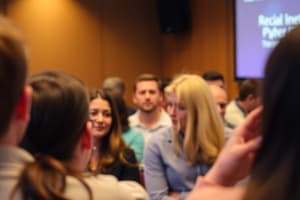Podcast
Questions and Answers
Which of the following is the MOST accurate, modern definition of social facilitation?
Which of the following is the MOST accurate, modern definition of social facilitation?
- The tendency to exert less effort on simple tasks when in the presence of others.
- The strengthening of dominant responses in the presence of others. (correct)
- The tendency to perform all tasks better when others are present, regardless of difficulty.
- The impairment of performance on complex tasks due to the presence of others.
According to the information provided, what is a fundamental characteristic of a group?
According to the information provided, what is a fundamental characteristic of a group?
- Members must live in the same geographical location.
- Members interact with and influence each other. (correct)
- Members must share identical opinions.
- Members must have known each other for a long time.
An individual who typically excels at solving complex puzzles at home finds that their performance declines significantly when attempting the same puzzles in a room full of people. This phenomenon is BEST explained by:
An individual who typically excels at solving complex puzzles at home finds that their performance declines significantly when attempting the same puzzles in a room full of people. This phenomenon is BEST explained by:
- The original meaning of social facilitation.
- The current meaning of social facilitation. (correct)
- Social loafing.
- Deindividuation.
Considering both the original and current meanings of 'social facilitation', under which condition would the presence of others MOST likely hinder performance?
Considering both the original and current meanings of 'social facilitation', under which condition would the presence of others MOST likely hinder performance?
A team of expert surgeons is performing a highly complex and novel surgical procedure. Based on the principles of social facilitation, what intervention strategy would MOST likely OPTIMIZE their performance?
A team of expert surgeons is performing a highly complex and novel surgical procedure. Based on the principles of social facilitation, what intervention strategy would MOST likely OPTIMIZE their performance?
According to Zajonc's model, social arousal enhances dominant responses. What does this imply for tasks of varying difficulty?
According to Zajonc's model, social arousal enhances dominant responses. What does this imply for tasks of varying difficulty?
According to the information presented, which condition most significantly increases the likelihood of children taking extra Halloween candy?
According to the information presented, which condition most significantly increases the likelihood of children taking extra Halloween candy?
Which sport demonstrates the highest home advantage according to the data provided?
Which sport demonstrates the highest home advantage according to the data provided?
Besides social facilitation, what is a possible explanation for the home advantage in sports?
Besides social facilitation, what is a possible explanation for the home advantage in sports?
What psychological effect does group shouting, chanting, clapping, and dancing have on individuals?
What psychological effect does group shouting, chanting, clapping, and dancing have on individuals?
Which of the following is the MOST direct opposite of deindividuation, according to the principles outlined?
Which of the following is the MOST direct opposite of deindividuation, according to the principles outlined?
How does crowding influence individual reactions, according to the principles outlined?
How does crowding influence individual reactions, according to the principles outlined?
In the context of group polarization, what outcome is MOST likely?
In the context of group polarization, what outcome is MOST likely?
Consider a professional musician who has performed a complex concerto hundreds of times. According to social facilitation theory, under what conditions would they be MOST likely to experience a decrement in performance due to the presence of an audience?
Consider a professional musician who has performed a complex concerto hundreds of times. According to social facilitation theory, under what conditions would they be MOST likely to experience a decrement in performance due to the presence of an audience?
Consider a scenario where a group of initially cautious investors discusses a new business venture. If the 'risky shift phenomenon' occurs, how would their investment decisions likely change after the group discussion, compared to their individual predispositions?
Consider a scenario where a group of initially cautious investors discusses a new business venture. If the 'risky shift phenomenon' occurs, how would their investment decisions likely change after the group discussion, compared to their individual predispositions?
What is a key finding regarding group discussions and individual decisions?
What is a key finding regarding group discussions and individual decisions?
Which scenario exemplifies the 'risky shift' dilemma?
Which scenario exemplifies the 'risky shift' dilemma?
What did Markus Brauer, et al.'s (2001) study reveal about French students' impressions after group discussion?
What did Markus Brauer, et al.'s (2001) study reveal about French students' impressions after group discussion?
In the context of group polarization, what is the 'accentuation effect' observed in schools?
In the context of group polarization, what is the 'accentuation effect' observed in schools?
Which of the following represents the most nuanced application of group polarization dynamics in contemporary society?
Which of the following represents the most nuanced application of group polarization dynamics in contemporary society?
Flashcards
Group
Group
Two or more people who interact and influence one another, perceiving themselves as an "us."
Social Facilitation (Original)
Social Facilitation (Original)
The tendency to perform simple or well-learned tasks better when others are present.
Social Facilitation (Current)
Social Facilitation (Current)
The strengthening of dominant responses in the presence of others.
Crowding
Crowding
Signup and view all the flashcards
Social Facilitation: Task Difficulty
Social Facilitation: Task Difficulty
Signup and view all the flashcards
Social Facilitation
Social Facilitation
Signup and view all the flashcards
Home Advantage
Home Advantage
Signup and view all the flashcards
Evaluation Apprehension
Evaluation Apprehension
Signup and view all the flashcards
Dominant Response
Dominant Response
Signup and view all the flashcards
Deindividuation
Deindividuation
Signup and view all the flashcards
Diminished Self-Awareness
Diminished Self-Awareness
Signup and view all the flashcards
Self-Awareness
Self-Awareness
Signup and view all the flashcards
Group Polarization
Group Polarization
Signup and view all the flashcards
Risky Shift Phenomenon
Risky Shift Phenomenon
Signup and view all the flashcards
Accentuation Effect
Accentuation Effect
Signup and view all the flashcards
Selective Exposure
Selective Exposure
Signup and view all the flashcards
Political Echo Chamber
Political Echo Chamber
Signup and view all the flashcards
Study Notes
- Groups consist of two or more individuals who interact for longer than a few moments, influence each other, and perceive one another as "us"
- Groups help us meet different human needs, like affiliation, achievement, and social identity
Social Facilitation
- It explores how we are affected by the presence of others
- The presence of others can affect behavior and cognition, with crowding being one aspect
- Arousal in the company of others depends on emotional state. If negative, it can hinder performance
- The original meaning of social facilitation is the tendency to perform simple or known tasks better when others are around
- In many cases, the presence of others boosts performance on simple tasks, yet impairs performance on difficult ones
- Social facilitation is also an explanation for home advantage in sports
- Home teams win about 6 in 10 games, especially in team-oriented sports
- Another contributing factor of social facilitation is that people around help you to perform
- Other possible factors for social facilitation are officiating bias, travel fatigue, familiarity with home context, and crowd noise
Crowding
- It refers to the influence of many others
- Others’ presence can increase the number of people in a group
- Large audiences may interfere with well-learned, automatic behaviors.
- The presence of others can intensify positive or negative reactions
- Being close to others magnifies liking for friendly people and disliking for unfriendly ones
- Fun is shared with others and can be more energizing
- Crowding has a similar effect to being observed as it enhances arousal
Why Arousal Occurs
- Dominant repsonses are strongestest when being evaluated
- Evaluation apprehension: concern for how others perceive is a factor
- Distraction from co-actors or the audience can create arousal
- The presence of others can cause innate social arousal
Social Loafing
- It occurs when individuals exert less effort in a group.
- Class group projects exemplify this when every student gets the same grade
- The collective effort in a group is often less than the sum of each individual's efforts
- Also refers to the tendency for those working towards a common goal to put in less effort
- The more people in a group, the less effort
- Free riders benefit from the group but give little in return
- Employees are more productive in group experiments when their individual performance is posted
- When the task is challenging, appealing, or involving, people are less likely to loaf in groups
- Groups loaf less when members are connected or feel indispensable to the group
Deindividuation
- It is when people lose their sense of self in groups, and arousal and diffused responsibility combine
- Acts range from a mild lessening of restraint to impulsive self-gratification to destructive social explosions
- It is the suppression of self-awareness and evaluation apprehension
- Deindividuation arises in group situations that foster responsiveness to either good or bad group norms
- The larger the group, the more its members lose self-awareness and are willing to commit atrocities
- Attention is focused on the situation
- Anonymity makes people less self-conscious, but more group-conscious
- Arousing people while distracting them has been shown to increase likelihood of aggressive outbursts by groups
Diminished Self-Awareness
- The reduction of self-awareness within groups
- These experiences tend to disconnect behavior and attitudes
- Self-awareness involves being in a self-conscious state where attention is focused on oneself, making people more sensitive to their own attitudes and dispositions
- Self-aware individuals have increased self-control and avoid cheating
- Circumstances decreasing self-awareness can increase deindividuation, whereas those that increase self-awareness decrease deindividuation
Group Polarization
- Concerns how groups intensify our opinions
- When groups strengthens the average tendency.
- Risk shift is not universal, some dilemmas lead people to be cautious after a discussion
Group Polarization Experiments
- When voters increased dislike of Donald Trump after a discussion
- Japanese students judgments as jury in a traffic case
- Judgments of political speech videos
- French students dislike of someone after discussion of negative impressions.
- Polarization of group that share same attitude
- High prejudice will be increased prejudice groups and vice-versa.
- Group polarization occurs in the everyday life.
- In schools, the “accentuation effect."
Explaining Group Polarization
- Informational Influence results from accepting evidence about reality
- Arguments and active participation matter
- Social comparison: evaluating one's opinions and abilities by comparing oneself with others.
- Pluralistic ignorance: a false impression of what most other people are thinking or feeling, or how they are responding.
Group Decision-Making
- Team spirit in work groups
- Groupthink: the mode of thinking that persons engage in when concurrence-seeking becomes so dominant
- Groupthink causes amiable conversations, group of the group from dissenting viewpoints, and directive leaders
Symptoms of Groupthink
- Groups overestimate their group's might and right
- Illusion of invulnerability.
- Unquestioned belief in the group's morality.
- Rationalization
- Stereotyped view of opponent
- Conformity pressure.
- Self-censorship
- Illusion of unanimity
- Mindguards, protect others over groups effectiveness
Groupthink Prevention
- Be impartial.
- Encourage critical evaluation.
- Occasionally subdivide the group, then reunite to air differences.
- Welcome critiques from outside experts and associates.
- Before implementing, call a second-chance meeting to air any lingering doubts.
- Group performance is enhanced through group and solitary brainstorming
- Group members communicate by writing
- Electronic brainstorming is incorporated
Minority Influence
- Determinants of minority include consistency, self-confidence, and defection.
- There is minority slowness effect: tendency for people with minority to express low
- Consistency and perspective is important
- Lone defector from the majority is more persuasive
- Task leadership: organizes work, sets standards, and focuses on goals.
- Social leadership: builds teamwork, mediates conflict, and offers support.
- Transformational leadership: enabled by a leader's vision and inspiration, exerts significant influence.
Studying That Suits You
Use AI to generate personalized quizzes and flashcards to suit your learning preferences.




